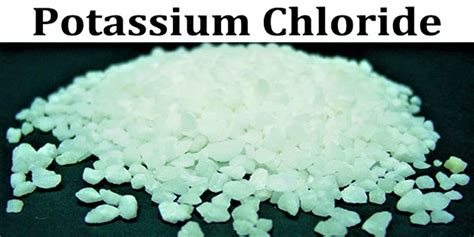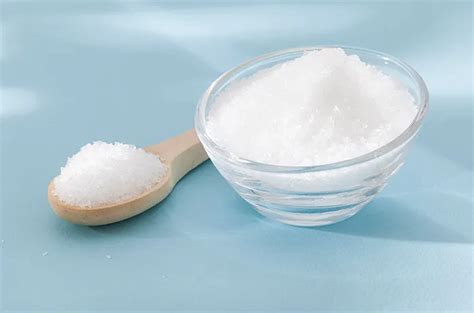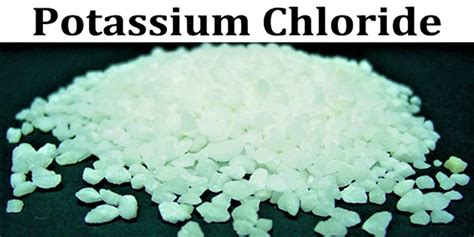Intro
Discover the potential risks of Potassium Chloride, including cardiac issues, gastrointestinal problems, and muscle weakness, as we explore its side effects, interactions, and warnings to ensure safe usage and minimize adverse reactions.
Potassium chloride is a medication that is used to treat various health conditions, including potassium deficiency, also known as hypokalemia. It is an essential mineral that plays a crucial role in maintaining proper heart function, muscle contractions, and nerve function. While potassium chloride is generally considered safe and effective, it can cause side effects in some individuals. In this article, we will delve into the world of potassium chloride side effects, exploring the benefits, working mechanisms, and potential risks associated with this medication.
The importance of potassium chloride cannot be overstated, as it helps to regulate fluid balance within the body, transmit nerve impulses, and support muscle function. With the increasing prevalence of hypokalemia, it is essential to understand the role of potassium chloride in maintaining optimal health. As we navigate the complexities of potassium chloride side effects, we will examine the various factors that contribute to these adverse reactions, including dosage, individual tolerance, and underlying medical conditions. By understanding the potential risks and benefits of potassium chloride, individuals can make informed decisions about their health and well-being.
The use of potassium chloride is widespread, and its effectiveness in treating hypokalemia has been well-documented. However, as with any medication, there are potential side effects to consider. These can range from mild to severe and may include gastrointestinal issues, such as nausea, vomiting, and diarrhea, as well as more serious complications, like cardiac arrhythmias and muscle weakness. It is crucial to weigh the benefits of potassium chloride against the potential risks, taking into account individual health needs and medical history. By doing so, individuals can minimize the risk of adverse reactions and maximize the therapeutic benefits of this essential medication.
Potassium Chloride Benefits

Regulation of Fluid Balance
Potassium chloride plays a crucial role in regulating fluid balance within the body. It helps to maintain proper electrolyte levels, which is essential for maintaining healthy blood pressure, promoting proper nerve function, and supporting muscle contractions. By regulating fluid balance, potassium chloride can help to prevent conditions such as edema, which is characterized by swelling caused by excess fluid retention.Support of Muscle and Nerve Function
Potassium chloride is essential for supporting muscle and nerve function. It helps to transmit nerve impulses, which is necessary for muscle contractions and relaxation. Additionally, potassium chloride helps to regulate muscle function, preventing conditions such as muscle weakness, cramps, and spasms.Potassium Chloride Side Effects

- Gastrointestinal issues, such as nausea, vomiting, and diarrhea
- Cardiac arrhythmias, such as irregular heartbeat and palpitations
- Muscle weakness, cramps, and spasms
- Fatigue and weakness
- Dizziness and lightheadedness
- Headaches and dizziness
It is essential to note that these side effects are typically mild and temporary, resolving on their own within a few days of treatment. However, in some cases, potassium chloride side effects can be more severe, requiring medical attention.
Severe Side Effects
In rare cases, potassium chloride can cause severe side effects, including:- Cardiac arrest
- Respiratory failure
- Severe allergic reactions, such as anaphylaxis
- Muscle paralysis
- Nerve damage
If you experience any of these severe side effects, it is crucial to seek medical attention immediately.
Potassium Chloride Interactions

- Diuretics, such as furosemide and hydrochlorothiazide
- Beta-blockers, such as metoprolol and propranolol
- ACE inhibitors, such as lisinopril and enalapril
- Angiotensin receptor blockers, such as losartan and valsartan
These interactions can increase the risk of side effects, such as cardiac arrhythmias and muscle weakness. It is essential to inform your healthcare provider about all medications you are taking, including prescription and over-the-counter medications, to minimize the risk of interactions.
Food Interactions
Potassium chloride can also interact with certain foods, including:- Salt substitutes, which can increase potassium levels
- Potassium-rich foods, such as bananas, avocados, and spinach
- Calcium-rich foods, such as dairy products and fortified plant-based milk
These interactions can increase the risk of side effects, such as cardiac arrhythmias and muscle weakness. It is essential to inform your healthcare provider about your diet and any supplements you are taking to minimize the risk of interactions.
Potassium Chloride Dosage

- 40-100 mEq per day for adults with hypokalemia
- 20-40 mEq per day for adults with mild hypokalemia
- 10-20 mEq per day for adults with potassium deficiency
It is essential to follow the recommended dosage and consult with your healthcare provider to determine the best course of treatment for your specific needs.
Administration
Potassium chloride can be administered orally or intravenously, depending on the individual's health needs and medical history. Oral administration is typically preferred, as it is less invasive and can be taken at home. However, in severe cases of hypokalemia, intravenous administration may be necessary to rapidly restore potassium levels.Potassium Chloride Precautions

- Informing your healthcare provider about all medications you are taking, including prescription and over-the-counter medications
- Informing your healthcare provider about your diet and any supplements you are taking
- Monitoring potassium levels regularly to avoid overdose or underdose
- Avoiding salt substitutes and potassium-rich foods to minimize the risk of interactions
By taking these precautions, individuals can minimize the risk of side effects and interactions, ensuring safe and effective treatment with potassium chloride.
Potassium Chloride Overdose

- Cardiac arrhythmias, such as irregular heartbeat and palpitations
- Muscle weakness, cramps, and spasms
- Fatigue and weakness
- Dizziness and lightheadedness
- Headaches and dizziness
If you suspect an overdose, it is crucial to seek medical attention immediately.
Potassium Chloride Contraindications

- Hyperkalemia, or high potassium levels
- Kidney disease, such as chronic kidney disease or acute kidney injury
- Heart disease, such as heart failure or cardiac arrhythmias
- Adrenal insufficiency, such as Addison's disease
It is essential to inform your healthcare provider about your medical history to determine if potassium chloride is safe and effective for your specific needs.
What is potassium chloride used for?
+Potassium chloride is used to treat hypokalemia, or potassium deficiency, and to prevent potassium deficiency in individuals with certain medical conditions.
What are the side effects of potassium chloride?
+The side effects of potassium chloride can include gastrointestinal issues, cardiac arrhythmias, muscle weakness, fatigue, and dizziness.
How is potassium chloride administered?
+Potassium chloride can be administered orally or intravenously, depending on the individual's health needs and medical history.
What are the precautions when taking potassium chloride?
+When taking potassium chloride, it is essential to inform your healthcare provider about all medications you are taking, monitor potassium levels regularly, and avoid salt substitutes and potassium-rich foods.
What is the recommended dosage of potassium chloride?
+The recommended dosage of potassium chloride varies depending on the individual's health needs and medical history, typically ranging from 40-100 mEq per day for adults with hypokalemia.
In conclusion, potassium chloride is a medication that is used to treat hypokalemia and prevent potassium deficiency in individuals with certain medical conditions. While it is generally considered safe and effective, it can cause side effects and interactions. By understanding the benefits, working mechanisms, and potential risks associated with potassium chloride, individuals can make informed decisions about their health and well-being. If you have any questions or concerns about potassium chloride, we encourage you to comment below or share this article with others who may benefit from this information. Additionally, we invite you to explore our website for more information on health and wellness topics, and to take specific actions to prioritize your health, such as consulting with a healthcare provider or making lifestyle changes to support overall well-being.
